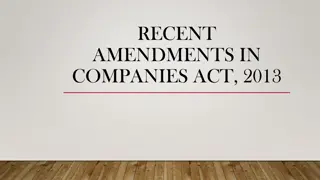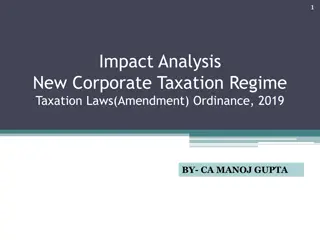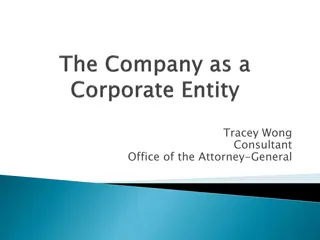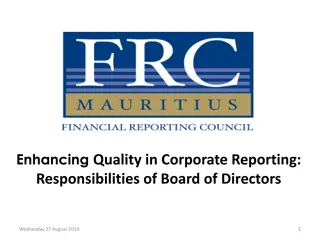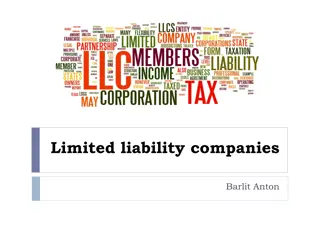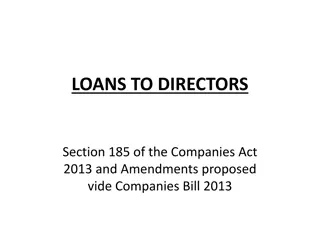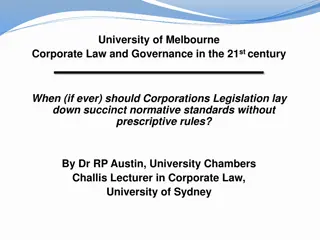Types of Companies in Corporate Administration
This article discusses the various kinds of companies in corporate administration, including incorporated, chartered, statutory, and registered companies. It covers the definition of a company, different types of legal entities, and examples of each type. The classification of companies based on incorporation is explored, highlighting the characteristics and distinctions between chartered, statutory, and registered companies.
Download Presentation

Please find below an Image/Link to download the presentation.
The content on the website is provided AS IS for your information and personal use only. It may not be sold, licensed, or shared on other websites without obtaining consent from the author. Download presentation by click this link. If you encounter any issues during the download, it is possible that the publisher has removed the file from their server.
E N D
Presentation Transcript
RNS FIRST GRADE COLLEGE DR. VISHNUVARDHAN ROAD, CHANNASANDRA, RR NAGARA, BANGALORE 98 SUBJECT :CORPORATE ADMINISTRATION TOPIC: KINDS OF COMPANY CLASS: I SEM BCOM CLASS: I SEM BCOM MANASA B MANASA B ASST.PROF ASST.PROF RNSFGC RNSFGC
COMPANY *A company is a legal entity formed by a group of individuals to engage in and operate a business commercial or industrial enterprise. *A Company can be defined as an "artificial person", invisible, intangible, created by or under law, with a discrete legal personality, perpetual succession, and a common seal. Except for some senior positions, companies remain unaffected by the death, insanity, or insolvency of an individual member.
KINDS OF COMPANY KINDS OF COMPANY KINDS OF COMPANY INCORPORATED COMPANY NUMBER OF MEMBER LIABILITY CONTROL OWNERSHIP CHATERED COMPANIES LIMITED LIABILITY PRIVATE HOLDING GOVERNMENT STATUTORY COMPANIES UNLIMITED LIABILITY NON- PUBLIC SUBSIDIARY GOVERNMENT REGISTERED COMPANIES
CLASSIFICATION OF COMPANIES CLASSIFICATION OF COMPANIES 1) ON THE BASIS OF INCOPORATION a) Chartered company: A chartered company is an association with investors or shareholders that is incorporated and granted rights (often exclusive rights) by royal charter (or similar instrument of government) for the purpose of trade, exploration, and/or colonization. Companies set up as a result of a royal charter granted by a king or queen of a country are known as chartered companies. Example: East India Company, the Bank of England
b) Statutory company: *As companies that are formed by the means of a special statute passed by the Parliament or the State Legislature. statutory companies in India are the Reserve bank of India, the Life Insurance Corporation of India Act, etc. *The Statutory origins of these companies provide power to such companies to be bound by their own statute, i.e. whenever there is any dispute between statute under which these companies were Companies Act 2013, special legislation persists over the general law of Companies Act. the name suggests, these are the The examples of formed the and the statute being
c) Registered Company: *A company that is registered under the Companies Act is known as a Registered registered companies are most common in practice. *Examples: Steel Authority of India Udyog Ltd., and Reliance Industries *As defined under Section 2(20) of the Companies Act, 2013, registered companies are the companies which get registered under the statute of the Companies Act. Companies are also provided with a certificate of incorporation by the Registrar of the Company. Company. Nowadays Ltd, Maruti
2) ON THE BASIS OF LIABILITY a) Limited Company: i) Company limited by shares: A company in which the liability of the members is limited to the face value of the shares held by them is known as Company limited by shares. If a member has paid the full face value of the shares held by him, he does not owe any further liability to the company. But in the case of partly paid shares, the liability of members is limited to the unpaid amount on the shares held by them.
2) ON THE BASIS OF LIABILITY a) Limited Company: ii) Company Limited by guarantee: In this type of company, the liability of members is limited to an amount as they agree to contribute to the assets of the company in the case of winding up of the company. This amount is known as the guarantee and it is also stated in the Memorandum of Association. The amount which was guaranteed by the members can only be called up at the time of winding up of the company. This type of company is normally formed to promote education, art, science, culture, and sports.
2) ON THE BASIS OF LIABILITY b) Unlimited liability: In this company, the liability of every member is unlimited and extends to his personal property. The members are personally liable to pay the debts of the company as per their share of interest. Sec 12-C of the Companies Act, 1956 provides the incorporation of a company having an unlimited liability of its members.
3) ON THE BASIS OF MEMBERS a) Private Company: A private company means which has a paid-up capital of Rs 1 lakh or higher paid-up capital as prescribed and which by its Articles of Association: (a) restricts the right of members to transfer its shares; (b) has a minimum of 2 and a maximum of 200 members, excluding the present and past employees; (c) does not invite the public to subscribe to its shares or debentures (d) does not invite or accept deposits from persons other than its members, directors, or their relatives. The minimum number of members to form a private company is two and a private company must use the word Private Limited or Pvt. Ltd. in its name.
3) ON THE BASIS OF MEMBERS b) Public company: A public company means a company which (a) is not a private company: (b) has a minimum of 7 members and no limit on the maximum members (c) has a paid-up capital of Rs 5 lakh or higher paid-up capital as may be prescribed (d) has no restriction on transfer of securities (e) a private company which is a subsidiary of a public company
4)ON THE BASIS OF CONTROL a) Holding company: indirectly holds more than half of the equity share capital of another company composition of the Board of Directors of some other company. A company can become a holding company of another company in the following ways: i ) By holding more than 50 % of the issued equity capital of the company ii) By holding more than 50% of the voting rights in the company iii) By holding the right to appoint the majority of the directors of the company Any company that directly or or controls the
4)ON THE BASIS OF CONTROL b) Subsidiary company company holds more than 51% of the nominal value of its equity share capital or more than 51 % of its voting power or control the majority composition Board of Directors or is the subsidiary of another subsidiary company. company: the The which subsidiary another is one in of its
5)ON THE BASIS OF OWNERSHIP Government GovernmentCompany Company: : As defined under Section 2(45) of the Companies Act, 2013, any company in which a minimum of 51 per cent of the paid-up share capital is held by the Central/State Government, and/or held fractionally by the Central Government and partly by one or more State Governments is known as a Government Company. The major drawback of having a government company is the lack of autonomy.
5)ON THE BASIS OF OWNERSHIP Non Non- -Government GovernmentCompany A non-governmental organization (NGO) is an organization that is not part of a government. They are non-profit making, voluntary and service oriented organizations. NGOs, sometimes called civil societies, are organized on community, national and international levels to serve a social or political goal such as humanitarian causes or the environment. Company: :
Conclusion *Various classifications have been made in this topic of Company based upon various factors of independence, liability, financial conduct etc. These classifications are not to be observed in isolation as the Company may have two or more characteristic features mentioned above and form a very unique kind for itself. The kinds of companies have only been made so as to ease the understanding of the complex legal being that is a Company. of the companies











![Enhancing Corporate Transparency: Analysing The Companies Amendment Bill [B27B-2023]](/thumb/60028/enhancing-corporate-transparency-analysing-the-companies-amendment-bill-b27b-2023.jpg)
